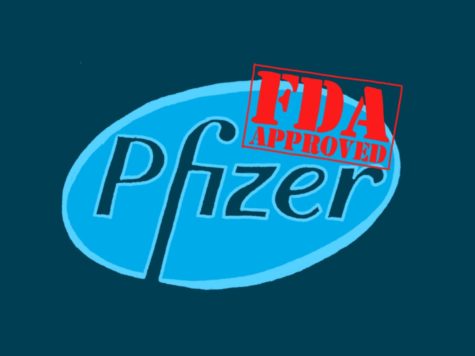FDA approves Pfizer vaccine, hopes to decrease vaccine hesitancy
September 16, 2021

On Aug. 23 the Food and Drug Administration officially approved the Pfizer COVID-19 vaccine for distribution to Americans aged 16 years and older. Prior to the approval, the FDA authorized an emergency use of the vaccines due to a lack of completion of their strict protocols. Generally, it takes years for the FDA to certify a drug or medication. Times are clearly different now, with the pandemic forcing scientists to quickly provide public safety for all Americans.
To gain FDA approval, numerous clinical trials took place under the auspices of biologists and medical professionals. Over 20,000 volunteers and patients were given the Pfizer-BioNTech COVID-19 vaccine, while another 20,000 plus patients received placebos.
Upon release, the vaccine will be marketed as Comirnaty. Comirnaty contains a type of genetic material called messenger RNA to create a synthetic protein of the virus, inducing a reaction in the immune system. According to the trials, “the vaccine was 91% effective in preventing COVID-19 disease.” The test groups were given another dose of the vaccine or placebo and were closely monitored for another few months.
Most of the side effects were minimal, including fatigue, headache, muscle pain and fever. Patients with Comirnaty were found to be far less susceptible to contracting COVID-19 and being hospitalized. Meaning, the FDA had collected enough evidence for a ubiquitous dissemination of the vaccine for people 16 and older.
Dr. Peter Marks, director of FDA’s Center for Biologics Evaluation and Research, said that he and many other scientists did their due diligence through conscientious work to approve the vaccine to the public in the safest possible manner. Additional studies will have to be completed so that those younger than 16 can receive an FDA-approved vaccine.
Moving forward, medical experts remain uncertain on the status of the unvaccinated population. Will they feel more safe getting a shot now? The answer is complicated. Based on Kaiser Family Foundation polls, around 30% of unvaccinated Americans are more willing to get the vaccine after FDA approval. As a result, there is a general consensus that universities, businesses, restaurants and other public places will require vaccinations.
Schools like Tulane University already require students, faculty and staff to show proof of vaccination in order to attend or work. The university reports that more than 95% of all students are fully vaccinated. However, this situation does not serve as a microcosm of the rest of society. There are millions of Americans who have still chosen to remain unvaccinated, aside from medical and religious exemptions.
Despite the recent remarkable medical advancements, there has not been any FDA authorization pertaining to individuals between the ages of 12 and 15. Children under 12 years of age are discouraged from getting the Pfizer vaccine until more trials have been completed. At the moment, health officials remain cautiously optimistic that vaccine hesitancy will subside among the U.S. population, but also acknowledge that the future is uncertain.






















Leave a Comment